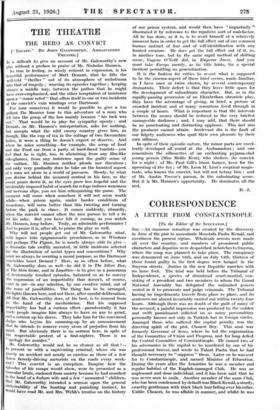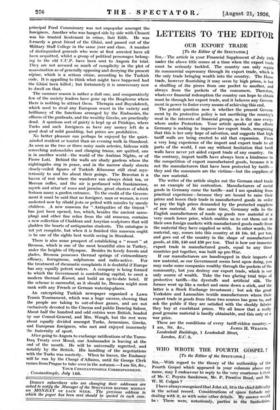CORRESPONDENCE
A LETTER FROM CONSTANTINOPLE [To the Editor of the SPECTATOR.]
SIR,—An immense sensation was created by the discovery in June of the plot to assassinate Moustafa Pasha Kemal., and overthrow the present regime. Wholesale arrests were made all over the country, and numbers of prominent public characters and deputies were despatched in batches to Smynus, where the coup was planned to take place. The conspiracy was denounced on June 16th, and on July 14th, thirteen of those found guilty in the first degree were hanged in the Smyrna streets. Justice in the new Republic marches with no lame foot. The trial was held before the Tribunal of Independence, a species of drumhead court-martial, con- sisting of a president and two members to whom the Grand National Assembly has delegated the unlimited powers vested in it to prosecute and judge criminals. The Tribunal having no impedimenta travels from place to place, and its sentences are almost invariably carried out within twenty-four hours. Although there was no doubt of the guilt of many of the accused, a painful impression was produced by the sudden and swift punishment inflicted on so many personalities personally known not only in Turkish but in foreign circles. Amongst those who suffered the capital penalty was the directing spirit of the plot, Choucri Bey. This man was formerly Governor of Seres, where he led the organization of the Committee of Union and Progress, and for long defied the Central Committee of Constantinople. He caused two of his adversaries in the capital to be murdered by one of his professional bravos, and wrote to Talaat Pasha that he had thought necessary to " suppress " them. Later on he was sent for to Constantinople, and named Minister of Education. During the years after the Armistice he was a member and regular habitué of the English-managed Club. He was an unpleasant and dour individual, and it has been said that he was never seen to smile. Another member of the same Club, who has been condemned by default was Black Kemal, a sturdy, swarthy gentleman with thick black hair falling over his collar. Unlike Choucri, he was affable in manner, and whilst he was principal Food Commissary was not unpopular amongst the foreigners. Another who was hanged side by side with Choucri was his trusted lieutenant in crime, Sari Edib. He was formerly a great friend of the Glulzi, and passed out of the Military Staff College in the same year and class. A number of distinguished generals who were at first arrested have all been acquitted, whilst a group of political personages belong- ing to the old C.U.P. have been sent to Angora for trial. They are not accused so much of complicity in the plot of assassination as of generally opposing and decrying the present regime, which is a serious crime, according to the Turkish code. It is appalling to think what might have happened had the Ghazi been killed ; but fortunately it is unnecessary now to dwell on that.
The summer season is rather a dull one, and comparatively few of the society leaders have gone up the Bosphorus where there is nothing to attract them. Therapia and Buyukdereh, Which used to rival any European resort in the variety and brilliancy of the functions arranged by the Embassies, the officers of the gunboats, and the wealthy Greeks, are practically dead. A spurious sort of gaiety is kept up at Prinkipo, where Turks and such foreigners as have any money left do a good deal of mild gambling, but prices are prohibitive.
No better pleasure can perhaps be enjoyed by the quiet- minded resident or tourist than an evening walk in Stamboul. As soon as the two or three noisy main arteries, hideous with screeching automobiles and clanging trams, are quitted, one is in another world—the world of the Arabian Nights, or of Pierre Loti. Behind the walls are shady gardens where the nightingales sing in peace, and in the narrow shady streets closely-veiled figures of Turkish Khanunxs still steal mys- teriously to and fro about their goings. The Bezestan is a haven of rest where the wanderer can always drink tea, or Meccan coffee, and the air is perfumed with frankincense, myrrh and attar of roses and jasmine, great clusters of which festoon many a garden entrance. To the credit of the Govern- ment it must be said that no foreigner, man or woman, is ever molested now by ribald jests or pelted with missiles by unruly children. , A new museum for "Antiquities of the Orient" has just been opened, too, which, besides the ancient sarco- phagi and other fine relics from the old museum, contains a new collection of Chaldean and Assyrian sculptures that will gladden the hearts of antiquarian students. The catalogue is not yet complete, but when it is finished this museum ought to be one of the sights best worth seeing in Stamboul.
There is also some prospect of establishing a " resort " at Broussa, which is one of the most beautiful sites in Turkey, ander the heights of Olympus. Besides its lovely forests and glades, Broussa possesses thermal springs of extraordinary efficacy, ferruginous, sulphurous and radio-active. For the treatment of rheumatic complaints it is doubtful if Europe has any equally potent waters. A company is being formed to which the Government is contributing capital, to erect a modern thermal Kurart, and build an up-to-date hotel. If the scheme is successful, as it should be, Broussa might soon rank with any French or German watering-places.
An enterprising Turkish newspaper organized a Lawn Tennis Tournament, which was a huge success, showing that the people are taking to out-of-door games, and are not exclusively devoted to the Cinema and public Dancing Saloon, About half the hundred and odd entries were British, headed by our Consul-General, and Mrs. Waugh, but the rest were about equally divided amongst Turks, Armenians, Greelcs, and European foreigners, who met and enjoyed immensely the fraternity of sport.
After going to Angora to exchange ratifications of the Turco- Iraq Treaty over Mosul, our Ambassador is leaving at the end of the month. He will be universally regretted, and notably by the British. His handling of the negotiations with the Turks was masterly. When he leaves, the Embassy will be run by the Charge d'Affaires, until Sir George Clerk lanies from Prague to take over in the autumn.—I am Sir, &e., YOUR CONSTANTINOPLE CORRESPONDENT. Constantinople, July 141h.



































 Previous page
Previous page